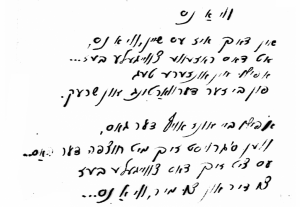1. For This
2. Rain
3. Spider
4. Night
5. Miracle
This song cycle was composed in 2017 for a special concert in memory of the Holocaust. It was premiered in Winnipeg in April 2017 by Sarah Kirsch, soprano; Bob Macleran, tenor; Oleg Pokhanovsky, violin; Minna-Rose Chung, cello; Judy Kehler-Siebert, piano.
This song cycle was revised after its premiere. Its present configuration is for soprano and piano trio. It is approximately 10 minutes in duration.
 This work is a setting of texts by poets of the Warsaw Ghetto. These Yiddish texts were hidden along with other cultural artifacts in the secret Ringelblum Archive. The texts were translated into English by Sarah Traitor Moskovitz and can be found at Poetry in Hell.
This work is a setting of texts by poets of the Warsaw Ghetto. These Yiddish texts were hidden along with other cultural artifacts in the secret Ringelblum Archive. The texts were translated into English by Sarah Traitor Moskovitz and can be found at Poetry in Hell.
Program notes:
The Ringelblum Archive is a collection of documents from the World War II Warsaw Ghetto, collected and preserved by the group known under the code name Oneg Shabbat, led by Jewish historian Dr. Emanuel Ringelblum. The group, which included historians, writers, rabbis and social workers, was dedicated to chronicling life in the Ghetto during the Nazis occupation. They worked as a team, collecting documents and soliciting testimonies and reports from dozens of volunteers of all ages. The materials submitted included essays, diaries, drawings, poetry, posters and other materials describing life in the Ghetto. The collection work started in September 1939 and ended in January 1943.
The members of Oneg Shabbat initially collected the material with the intention that they would write a book after the war about the horrors they had witnessed. As the pace of deportations increased, and it became clear that the destination was the Treblinka death camp, Ringelblum had the archives stored in three milk cans and ten metal boxes, which were then buried in three places in the Ghetto. All but three members of the Oneg Shabbat were murdered in the genocides. Emanuel Ringelblum escaped the ghetto, but continued to return to work on the archives. In 1944 Ringelblum and his family were discovered and were executed along with those who hid them.
After the war, Rokhl Auerbakh, one of the three surviving members of Oneg Shabbat, initiated the search for and excavation of the buried chronicles. Two of the canisters, containing thousands of documents, were unearthed in 1946 and a further ten boxes in 1950. The third cache is rumored to be buried beneath what is now the Chinese Embassy in Warsaw but a search in 2005 failed to locate the missing archival material.
Part of the permanent exhibition at the Museum of the History of Polish Jews is dedicated to Oneg Shabbat.
